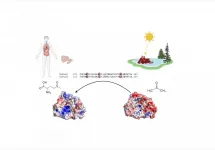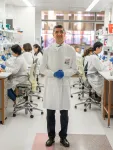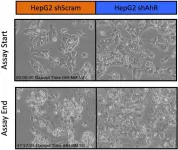Patient expectations, doctors' prescribing habits, and antimicrobial resistance
Reducing expectations for antibiotics in patients with upper respiratory tract infections: A primary care randomized controlled trial
2021-05-11
(Press-News.org) Antibiotics: Patient Expectations and Doctors' Prescribing Habits May Contribute to Antimicrobial Resistance
Inappropriate antibiotic prescribing for upper respiratory tract infections contributes to antibiotic resistance, making some bacterial infections difficult to treat. This often leads to higher medical costs, prolonged hospital stays and increased mortality. Still, many physicians report prescribing antibiotics at their patients' request. To address patients' expectations for antibiotic prescribing for URTIs, researchers conducted an experiment in which study participants were assigned brief educational videos to watch on a tablet immediately prior to their appointment.
The authors randomized patients into three groups - one that viewed a presentation about the futility of antibiotic treatment of URTIs; a second group that viewed a presentation about the adverse effects associated with antibiotics; and a third control group that learned about the benefits of healthy diet/exercise. The researchers then measured the effects of the presentations on patients' beliefs that antibiotics are helpful for URTIs; their expectations to be prescribed an antibiotic; and whether they were actually prescribed antibiotics for their URTIs. Participants who viewed either the futility or adverse effects presentations had greater reductions in their expectations of receiving antibiotics compared to the group that viewed the video about the benefits of healthy/diet and exercise. However, there was no significant difference between the three groups when it came to doctors actually prescribing antibiotics to patients. Researchers concluded that a brief, tablet-based waiting room intervention significantly changes participants' expectations on receiving antibiotics for URTIs, but that future efforts to improve antibiotic prescribing need to involve both patients and their doctors.
INFORMATION:
Reducing Expectations for Antibiotics in Patients With Upper Respiratory Tract Infections: A Primary Care Randomized Controlled Trial
Anna Perera, MBChB, et al
University of Auckland, Department of Psychological Medicine, Auckland, New Zealand
https://www.annfammed.org/content/19/3/232
ELSE PRESS RELEASES FROM THIS DATE:
2021-05-11
Skoltech scientists have created a new monitoring system for agricultural applications that performs real-time image segmentation on board the drone to identify hogweed. The research was published in a high-profile journal, IEEE Transactions on Computers.
Sosnovsky's hogweed is equally hazardous for farming, local ecosystems, and human health. Direct contact with human skin, especially if aggravated by exposure to the Sun, causes severe burns that require continuous medical care and take weeks to heal. The rampant spread of Sosnovsky's hogweed has become a real environmental disaster that extends across the whole of ...
2021-05-11
Individuals with diabetes are at greater risk of developing oral health issues, like gum disease, yet care for these linked health issues are usually disconnected, split between primary care and dental care. A research team from the University of Amsterdam developed an intervention that provided primary care-based oral health information and dental referrals for patients with diabetes. In a cluster randomized controlled trial, 764 patients from 24 primary care practices received either the oral health support or standard primary care. Participants were asked to rate their oral health quality of life, as well as their general health and any oral health complaints, at the start and end of the study. Analysis showed that individuals who received the primary care-based oral health support ...
2021-05-11
Though different fabrication approaches exist, two-step deposition is one of the main experimental techniques now used to make efficient, stable PSCs, especially on the industrial scale. The process involves first depositing lead iodide (PbI2) and then adding halide salts of monovalent cations such as methylammonium iodide (MAI) and formamidinium iodide (FAI) to convert it to perovskite.
While this two-step deposition is better than other options, it is difficult to maintain reproducible high performance and long-term stability when scaling up, mostly because of a lack ...
2021-05-11
EAST LANSING, Mich. - An acute loss of smell is one of the most common symptoms of COVID-19, but for two decades it has been linked to other maladies among them Parkinson's disease and dementia. Now, a poor sense of smell may signify a higher risk of pneumonia in older adults, says a team of Michigan State University researchers.
"About a quarter of adults 65 years or older have a poor sense of smell," said Honglei Chen, a professor in the Department of Epidemiology and Biostatistics within MSU's College of Human Medicine. "Unlike vision or hearing impairment, this sensory deficit has been largely neglected; more than two-thirds of people with a poor sense of smell do not know they have it."
In a first-of-its-kind study, Chen and his team found a possible link ...
2021-05-11
Simon Fraser University researchers have designed a remarkably fast engine that taps into a new kind of fuel -- information.
The development of this engine, which converts the random jiggling of a microscopic particle into stored energy, is outlined in research published this week in the END ...
2021-05-11
Scientists now better understand early bacterial evolution, thanks to new research featuring University of Queensland researchers.
Bacteria comprise a very diverse domain of single-celled organisms that are thought to have evolved from a common ancestor that lived more than three billion years ago.
Professor Phil Hugenholtz, from the Australian Centre for Ecogenomics in UQ's School of Chemistry and Molecular Biosciences, said the root of the bacterial tree, which would reveal the nature of the last common ancestor, is not agreed upon.
"There's great debate about the root of this bacterial tree of life and indeed whether bacterial evolution should even be described as a tree has been contested," Professor ...
2021-05-11
Just a few changes to an enzyme's amino acids can be enough to dramatically change its function, enabling microbes to inhabit wildly different environments.
University of Queensland microbiologist Associate Professor Ulrike Kappler, led by an international team of researchers, made this discovery when investigating how Haemophilus influenzae bacteria colonise the human respiratory system.
"This disease-causing bacterium is supremely adapted to living in humans, so much so that they cannot survive anywhere else," Dr Kappler said.
"It turns out that one enzyme, MtsZ, is the key player in this adaptation.
"But, surprisingly, ...
2021-05-11
Researchers have been able to reduce scarring by blocking part of the healing process in research that could make a significant difference for burns and other trauma patients.
University of Queensland Professor Kiarash Khosrotehrani said scars had been reduced by targeting the gene that instructs stem cells to form them in an animal study.
"The body's natural response to trauma is to make plenty of blood vessels to take oxygen and nutrients to the wound to repair it," Professor Khosrotehrani said.
"Once the wound has closed, many of these blood vessels become fibroblast cells which produce the collagens forming the hard materials found in scar tissue.
"We found that vascular stem cells determined whether a blood vessel was retained or gave rise to scar material ...
2021-05-11
CORVALLIS, Ore. - A team of Oregon State University scientists has discovered a new class of anti-cancer compounds that effectively kill liver and breast cancer cells.
The findings, recently published in the journal Apoptosis, describe the discovery and characterization of compounds, designated as Select Modulators of AhR-regulated Transcription (SMAhRTs).
Edmond Francis O'Donnell III and a team of OSU researchers conducted the research in the laboratory of Siva Kolluri, a professor of cancer research at Oregon State. They also identified the aryl hydrocarbon receptor (AhR) as a new molecular target ...
2021-05-11
Researchers looking to help people suffering from addiction, depression, and pain are studying how certain brain neurons operate to see if they can be controlled.
In a paper published May 11 in Neuron, researchers at the University of Washington School of Medicine and Washington University in St. Louis, along with several other universities, successfully used a protein called parapinopsin to turn off brain circuits. This protein is found in lamprey - an ancient lineage of jawless fish similar to eel. Reserachers said the ability to inhibit neurons could eventually lead to turning ...
LAST 30 PRESS RELEASES:
[Press-News.org] Patient expectations, doctors' prescribing habits, and antimicrobial resistance
Reducing expectations for antibiotics in patients with upper respiratory tract infections: A primary care randomized controlled trial





